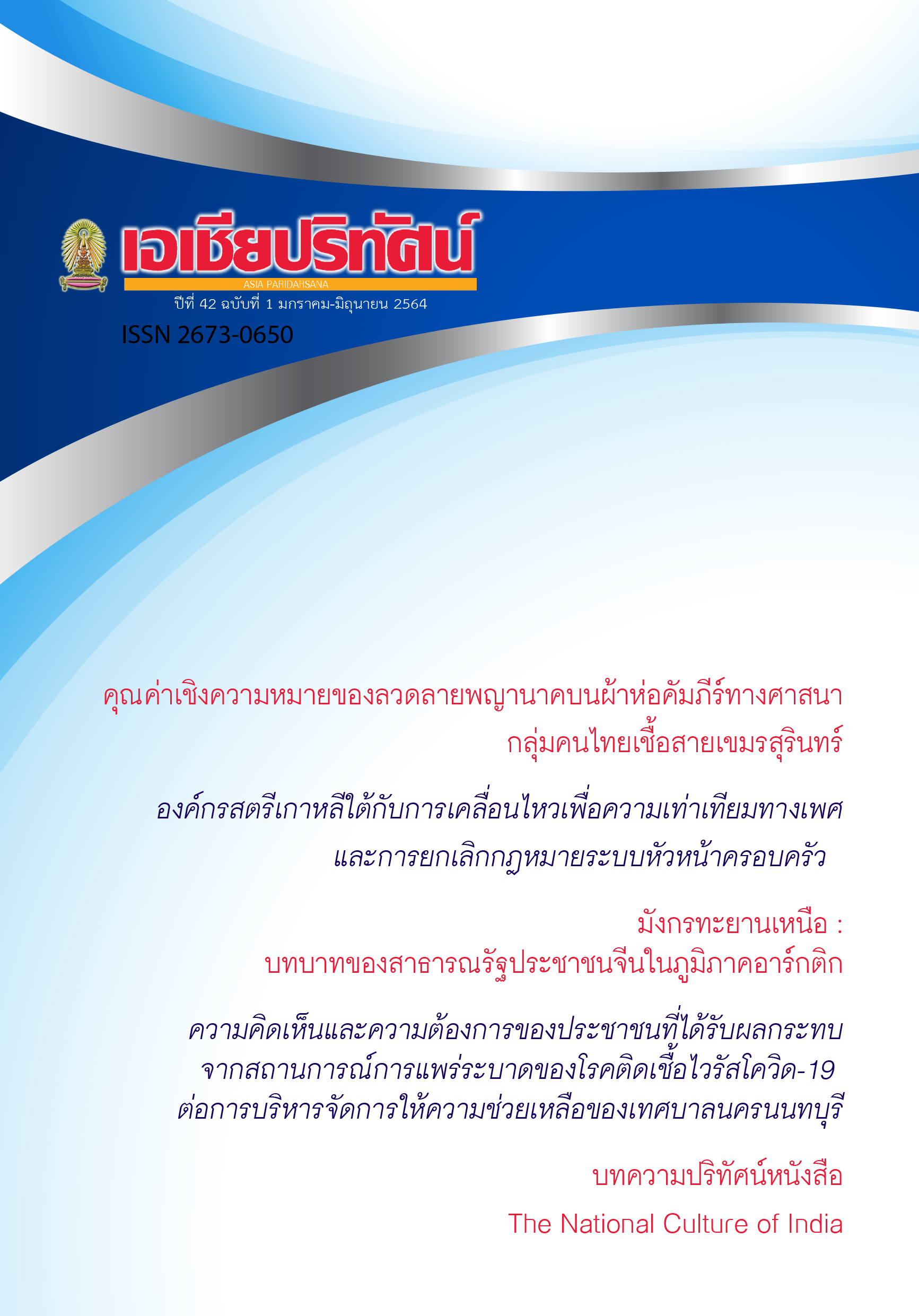Women’s Organizations and the Movement for Gender Equality and the Abolition of the Head-of-family System in South Korea
Main Article Content
Abstract
The paper examines the development of, and the factors impacting on, the women's organizations and the movement in South Korea for gender equality through the process of law revision, which contributed to the revision of the Family Law and the abolition of the head-of-family system in 2005. The paper also examines the current situation of women's rights in South Korea. A historical qualitative research methodology was used through a study of documents.
The study has found that the 1912 head-of-family system, which placed the man as the legal head of the family, had become the symbol of gender inequality in Korean society. Women's organizations have played a major role since the 1950s in the movement for gender equality and revision of the Family Law. The essence of the women's organization movement in South Korea lies in a struggle for gender equality, focusing on the abolition of the head-of-family system as the symbol of gender inequality. The movement has also involved campaigns for equal opportunities for and treatment of men and women in employment and the elimination of sexual harassment and violence against women. The landmark reform of the Family Law will be analyzed in connection with the local women's
movement, national politics, and international organizations. The 1990s saw the role of the women's organizations in the human rights movements following the global trend. The women's organizations had an influence on the legislative process and the implementation of women's policies of the state. The head-of-family system was finally abolished in 2005. However, the movement to abolish discrimination against women, which has given rise to gender-based conflict and controversy in South Korean society nowadays, is also under way.
Article Details
References
ภาษาไทย
คู, ฮาเก็น. 2552. แรงงานเกาหลีวัฒนธรรมและการเมืองว่าด้วยการก่อตัวทางชนชั้น. แปลโดย ธัญลักษณ์ เหลืองวิสุทธิ์. กรุงเทพฯ: วิภาษา
ทิวดอร์, แดเนียล. 2560. มหัศจรรย์เกาหลีใต้: จากเถ้าถ่านสู่มหาอํานาจทางเศรษฐกิจและวัฒนธรรม. แปลโดย ฐิติพงษ์ เหลืองอรุณเลิศ. กรุงเทพฯ:โอเพ่นเวิลด์ส
พิพาดา ยังเจริญ. 2560. “ประวัติศาสตร์เกาหลี.” ใน เกาหลีใต้ปัจจุบัน, นภดล ชาติประเสริฐ (บรรณาธิการ), 1-57. ปทุมธานี: ศูนย์เกาหลีศึกษา สถาบันเอเชียตะวันออกศึกษา มหาวิทยาลัยธรรมศาสตร์.
มุน, ฮย็อนนา. 2560. การเปลี่ยนแปลงของเศรษฐกิจเกาหลีและการเปลี่ยนแปลงโครงสร้างครอบครัวเกาหลี. แปลโดย พรรณนิภา ซอง. กรุงเทพฯ: สํานักพิมพ์แห่งจุฬาลงกรณ์มหาวิทยาลัย.
วิลาสินี พนานครทรัพย์. 2560. “พลวัตของครอบครัวและบทบาทผู้หญิงในสังคมเกาหลีใต้.” ใน เกาหลีใต้ปัจจุบัน, นภดล ชาติประเสริฐ (บรรณาธิการ) 299-341. ปทุมธานี: ศูนย์เกาหลีศึกษา สถาบันเอเชียตะวันออกศึกษา มหาวิทยาลัยธรรมศาสตร์
เสกสรร อานันทศิริเกียรติ. 2019. “จาก #Metoo ถึง#Youto0 สํารวจการสร้างความ
ตื่นรู้เรื่องเพศในสังคมเกาหลีใต้." เข้าถึงเมื่อ 19 มิถุนายน 2564.
https://themomentum.co/metoo-youtoo-south-koreal
ศิริพร ดาบเพชร. 2559. ญี่ปุ่นกับการสร้างจักรวรรดินิยม. กรุงเทพฯ: โรงพิมพ์จรัลสนิทวงศ์การพิมพ์.
ภาษาอังกฤษ
Allen, Paula. 2015. "70 Years on, the "Comfort Women" Speaking out so the truth won't die." Accessed November 5, 2019. https://www. amnesty.org/en/latest/campaigns/2015/09/70-years-on-comfortwomenspeak-out-so-the-truth-wont-diel.
"Survey finds MeToo movement has improved S. Korea's workplace culture". 2019. Hankyoreh. Accessed November 27, 2019. http://english.hani.co.kr/arti/english_edition/e_national/890257.html.
Hur, Song-Woo. 2011. Mapping South Korean Women's Movements During and After Democratization: Shifting Identity. In East Asian Social Movements, edited by Broadbent, Jeffrey, and Brockman, Vicky, 181-203. New York: Springer.
Kang, Inyoung. 2018. “Overlooked No More: Yu Gwan-sun, a Korean
Independence Activist Who Defied Japanese Rule". Accessed November 30, 2019. https://www.nytimes.com/2018/03/28/obituaries/ overlooked-yu-gwan-sun
Kim, Ashley. 2019. "Womad: The New Face Feminism in Korea?" Accessed November 28, 2019. https://bpr.berkeley.edu/2019/09/08/ womad-the-new-face-of-feminism-inkoreal.
Kim, Heisook. 2009. “Feminist Philosophy in Korea: Subjectivity of Korean Women." Signs 2 (34): 247-251.
Kim, Kyounghee. 1998."Gender Politics in South Korea: The Contemporary
Women's Movement and Gender Policies, 1980-1996." Dissertation Ph.D. (Sociology), Graduate School of the University of WisconsinMadison. Accessed October 20, 2018. https://search-proquest-com. clvpn.swu.ac.th/docview/304466476/ 3D1CAD4E759A4594PQ/1? accountid=44800
Kim, Mikyoung. 2003. "South Korean Women workers' Labor Resistance
in the Era of Export-Oriented Industrialization, 1970-1980." Development and Society 32 (1): 77-101.
Kim, Seungkyung. 2014. The Korean Women's Movement and the State. New York: Routledge.
Kim, Kyounghee. 2002. “A Frame Analysis of Women's Policies of Korean
Government and Women's Movements in the 1980s and 1990s." Korea Journal 42 (2): 5-36.
Kim, Yeong-hui 2000. “Theories for a Progressive Women's Movement in Korea." Korea Journal 40 (3): 217-236.
Korean Women's Development Institute. 2017. "Women in Korea 2016.” Accessed November 12, 2018. http://eng.kwdi.re.kr/contents/periodicals/statistics.jsp?chkYear=2017
Korea Legislation Research Institute. 2017. "Civil Act." Accessed November 14, 2018. https://elaw.kli.re.kr/eng_service/lawView. do?lang=ENG&hseq=1034
Kwon, Jake. 2019. “South Korea's young men are fighting against feminism." Accessed November 29, 2019. https://edition.cnn. com/2019/09/21/asia/korea-angry-youngmen-intl-hnk/index.html
Lee, Na-Young. 2014. "The Korean Women's Movement of Japanese Military "Comfort Women": Navigating between Nationalism and Feminism." Korean Studies 17 (1): 71-92.
Nam, Jeong-Lim. 2000. "Gender Politics in the Korean Transition to Democracy." Korean Studies 24: 94-112.
Nam, Sanghui. 2010. "The Women's Movement and the Transformation of the Family Law in South Korea. Interactions Between Local, National and Global Structures." European Journal of East Asian Studies 9 (1): 67-86.
SBS Popasia. 2018. "Male Fans Burn Red Velvet Merch Because Irene Read a Feminist Novel." Accessed November 16, 2018. https:// www.sbs.com.au/popasia/blog/2018/03/19/ male-fans-burn -redvelvet-merch-because-irene-read-feminist-novel
Shaun, O'Dwyer. 2019. “Korean nationalism and the 'Comfort Women' issue." Accessed November 5, 2019. https://www.japantimes. co.jp/opinion/2019/09/23/commentary/ japancommentary/koreannationalism-comfort-women-issue/#XCERES-B1p8.
Yang, Hyunah. 2002. "Unfinished Tasks for Korean Family Policy in the 1990s: Maternity Protection Policy and Abolition of the Family-Head System." Korea Journal 42 (2): 68-99.
Yang, Hyunah. 2008. “A Journey of Family Law Reform in Korea: Tradition, Equality,and Social Chang.” Journal of Korean Law 1 (8):77-94.


